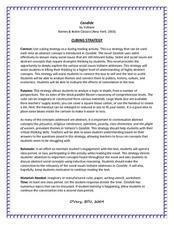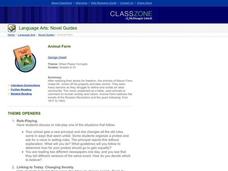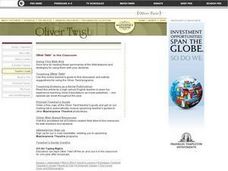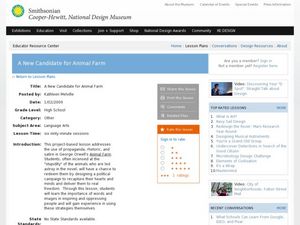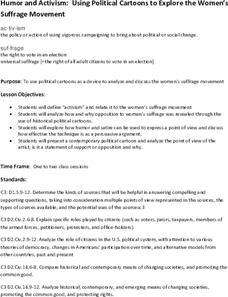Curated OER
Modern Minstrelsy: Exploring Racist Stereotypes in Literature and Life
Satires may be designed to expose a bias to ridicule but if misunderstood can they reinforce that bias? Langston Hughes poem, “Minstrel Man” opens a discussion of racist stereotypes, the minstrel tradition, and the musical, “The...
Curated OER
Candide Cubing Strategy
Candide is a dense text. To assist in analyzing Voltaire's satire, groups employ a cubing strategy based on Bloom's taxonomy. Complete directions for the strategy, a template for the cube, a worksheet, and a topic list are included.
Curated OER
Vocabulary Comic Strips
Who says comic strips aren’t educational? Prove these naysayers wrong by asking your class members to create a comic strip for a selected vocabulary word. Using online technological tools that provide access to an array of options for...
Curated OER
Chaucer's Wife of Bath
A thorough and well-designed resource for older learners, this lesson focuses on Chaucer's character the Wife of Bath from his classic novel, The Canterbury Tales. As a way of understanding Chaucer's complex characterization and...
Curated OER
Animal Farm
Students read Animal Farm and examine how power corrupts. They role-play situations involving power and control. They investigate corruption and abuse of power in society. They write propaganda articles and hold panel discusssionsabout...
Curated OER
Literature: Oliver Twist In The Classroom
Students view the Masterpiece Theatre presentation of Oliver Twist. the lesson includes plot summaries of the three episodes as well as before and after viewing activities. In addition, there are discussion and activity suggestions to...
National Endowment for the Humanities
Mark Twain and American Humor
“The Celebrated Jumping Frog of Calaveras County” is famous, in part, because it established a uniquely American form of humor. For this famous story, Mark Twain combines the tall-tale, the dialect story, and satire. Here is a resource...
Council for Economic Education
Jokes, Quotations, and Cartoons in Economics
Humor offers a great tool teach the basics of economics to scholars via video clips, satire, and political cartoons. Individuals create their own economic humor to present to the class—with the assistance of Daryl Cagel's online...
What So Proudly We Hail
The Meaning of America: Equality
What if society sought equality by handicapping the gifted and dispelling any traces of diversity? Kurt Vonnegut Jr. offers one possible answer to this question through his incredibly engaging and thought-provoking satirical...
The New York Times
Evaluating Sources in a ‘Post-Truth’ World: Ideas for Teaching and Learning about Fake News
The framers of the United States Constitution felt a free press was so essential to a democracy that they granted the press the protection it needed to hold the powerful to account in the First Amendment. Today, digital natives need to...
Curated OER
A New Candidate for Animal Farm
Students create an advertising campaign in which a candidate from Animal Farm will run for an upcoming election. For this follow-up activity to George Orwell's Animal Farm lesson, students explore propaganda, rhetoric, and satire as they...
Curated OER
The Cotillion or One Good Bull is Half the Herd, a Black Arts Movement novel by John O. Killens
Students study late twentieth-century African American satirical literature as well as its cultural antecedents. they analyze and discuss, within the contexts of race and gender, the social criticism of the middle classes presented by...
Maine Content Literacy Project
Introduction to John Updike
Expand your pupils' understanding of the short story genre with a study of John Updike and his story "A&P." This lesson plan, the fourth in a series of fourteen, invites learners to examine literary terms and read and discuss the...
Global Oneness Project
Clowning Around
Being a clown is hard work — no joke! Emmanuel Vaughan-Lee's Laugh Clown Laugh, a short film about German clown Reinhard "Filou" Harstkotte, asks viewers to consider the various roles played by clowns and to consider the implications of...
PBS
Catch-22: What It Means to Be a(n Anti)Hero
Catch-22, Joseph Heller's send-up of military organizational bureaucracy, provides readers with an opportunity to consider the importance of the anti-hero. Class members fill out a worksheet comparing and contrasting the qualities of...
National Woman's History Museum
Humor and Activism
As part of their study of the women's suffrage movement, groups analyze political cartoons and drawings. They create a caption for an image from the time, add an exhibit label that provides a context for their drawing, and post as part...
National Endowment for the Humanities
Nathaniel Hawthorne and Literary Humor
Young scholars examine Nathaniel Hawthorne's style of humor and compare it to other humorists. They discuss the purpose of literary humor and determine how it develops characters and plots in stories. They analyze the use of different...
Curated OER
The Rest Cure: Gender in Medicine and Literature
Read and discuss "The Yellow Wall-Paper" and the gender issues that the story brings up. Use articles from the time period to analyze, complete with specific discussion questions. After two days, scholars write an essay based on topics...
Dream of a Nation
Writing a Narrative Essay
Imagine using narrative essays to encourage change. This multi-week unit plan does just that. After reading a series of articles from Tyson Miller's Dream of a Nation: Inspiring Ideas for a Better America, class members examine the...
Curated OER
'Me Fail English? That's Unpossible' : Studying Literature with "The Simpsons"
Does your class love The Simpsons? It might seem dated, but with reruns constantly popping up on television, this show still holds the attention of most of your learners. Play the opening sequence of an episode, and brainstorm any...
Curated OER
When I Set My Hat at a Certain Angle: Trying on Zora Neale Hurston's Voice to Dress-up Prose
After reading and evaluating examples of prose nonfiction by Zora Neale Hurston and other authors, high schoolers write a personal reflective essay rich in figurative language. By incorporating this strategy, they utilize voice within...
Curated OER
Mark Twain: Straddling the Civil War
Mark Twain's life, politics, writing, and role as a mirror of pre- and post-Civil War American culture are the focus 11th and 12th graders in this section from an expansive author study. A critical writing assignment comparing Twain to...
Curated OER
Who Fought for the Union?
Learners read New York Times articles, letters, and listen to songs written from a soldier's perspective during the Civil War in order to understand who was fighting in the Union Army. This is a great lesson, complete with weblinks,...
Curated OER
Constructing Narrative from the Migrant Experience in Literature
Excerpts from John Steinbeck's The Grapes of Wrath and from John Fante's Ask the Dust, as well as a variety of primary source documents provide the background for an examination of the migrant experience from 1920-1945.
Other popular searches
- Comedy Farce Satire
- Satire in Tom Sawyer
- Satire Comedy
- How to Teach Satire
- Writing Satire
- Canterbury Tales and Satire
- Political Satire
- Satire and Literature
- Satire Lesson
- Exploring and Using Satire
- Satire; Alexander Pope
- King Lear Satire



